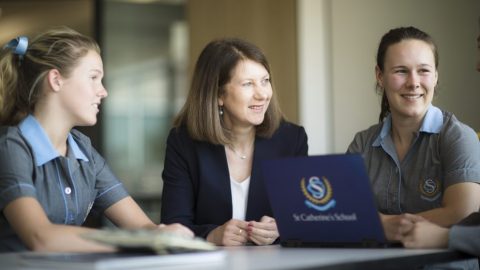From the Director of Student Wellbeing

Raising a Generation of Generosity through Connecting with Community
Clinical psychologist Andrew Fuller explains that building resilience involves creating “safe, healthy and fulfilling lives”. Providing a safe and healthy environment for children and teenagers is certainly a key role of parents and teachers, but how best should we guide young people to lead a fulfilling life?
Fuller and other leading psychologists and educators believe that the key to teaching young people how to find fulfilment is to provide them with opportunities to develop kindness, empathy, generosity and gratitude. In a world where immediate gratification and the ‘me generation’ seems to be the norm, we face the challenge of providing experiences for young people where they can learn the value of connection, community and caring. Fuller advises parents and educators to encourage young people to “become involved in community service projects to instil values like kindness, gratitude and compassion”.¹
Resilient Youth Australia lists four domains within the ‘Fulfilment Pathway’:
- Educational engagement
- Social Engagement
- Positive Identity
- Positive values
Fuller notes that there is a common thread to each of these domains: the connection between experiential learning, engagement with the community and the development of self-esteem and a growing sense of purpose in life. He writes that “Developing and deepening personal values is a crucial aspect of a young person’s development which eventually leads to deep commitments that guide how they think and act”.
Through community service and volunteering, young people develop empathy and resilience helping to guide them toward leading a purposeful life. Youth Volunteering Australia notes that the “benefits of volunteering for young people are both personal and social, and include strengthening social relationships, developing skills, enhancing career prospects, contributing to community and ‘making a difference’ “. ² It is the sense of empowerment that young people derive from a sense that they are making a difference that is so crucial to experiential learning of this type.
Actively engaging with the community can also promote intergenerational understanding, cultural understanding and break down social stereotypes. As Daniel Goleman, the psychologist renowned for his research into the importance of emotional intelligence puts it, without empathy a person is “emotionally tone deaf”.³
The community service programs at St Catherine’s provide an opportunity to give back to the community but are also an integral part of educating the girls for their future. The qualities of empathy, caring and compassion are not only integral to successful relationships in any community, but research shows that children who can empathise with and take responsibility for others are more likely to be happier and more successful. The Harvard Graduate School of Education’s ‘Making Caring Common’ project, notes that caring, ethical people have “strong relationships that are a key ingredient of happiness.” They extend this influence to the 21st Century workplace, observing that “success often depends on collaborating effectively with others, and children who are empathic and socially aware are also better collaborators.”
St Catherine’s Community Service programs provide the girls with the opportunity to, not only participate in but to reflect on their experience, enabling this meaningful engagement with themselves and the community. The Year 9 Heyington to Highlands experience resonates deeply with students, helping to shape their personal and global perspective. The Year 9 and 10 Leadership Diploma requires a minimum of 24 hours of community service but many girls choose to do more and, in some cases, continue to volunteer throughout their schooling, signifying the personal value they have gained from serving others. The Year 9 weEngage and Year 10 weEmbrace Wellbeing themes encompass these increasingly important values of community involvement. The Year 9 FareShare Schools in the Kitchen program which provides meals for those in need and the Year 10 Friday Night School volunteer program, where the girls assist refugee children and teenagers with their homework, are one of many opportunities where their generosity is invaluable. The 2018 Year 8 Central Australia Experience will likewise provide an opportunity for cross-curricular connections, personal and interpersonal growth and cultural understanding.
As Mark Twain wisely observed, “To get the full value of joy you must have someone to divide it with”. The joy in their smiles in Fiji, in the FareShare kitchens or at Friday Night School is a reminder of why community service programs and trips are an essential part of guiding our girls toward a fulfilling and purposeful life.
-
http://www.resilientyouth.org.au/
-
https://docs.education.gov.au/system/files/doc/other/youth_volunteering_evidence_review_0.pdf
-
Goleman, Daniel. Working with Emotional Intelligence, Bloomsbury, 1998


